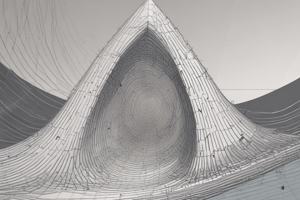Podcast
Questions and Answers
What is the major axis length of the ellipse to be drawn?
What is the major axis length of the ellipse to be drawn?
- 40 mm
- 70 mm (correct)
- 80 mm
- 60 mm
How should the circles be divided?
How should the circles be divided?
- Into 10 equal parts
- Into 8 equal parts
- Into 12 equal parts (correct)
- Into 6 equal parts
What is the method used to draw the tangent at point P?
What is the method used to draw the tangent at point P?
- Straight Line Method
- Focus-Directrix Method (correct)
- Concentric Circle Method
- Eccentricity Method
At which point is the line perpendicular to PF1 drawn?
At which point is the line perpendicular to PF1 drawn?
What represents the minor axis in the construction of the ellipse?
What represents the minor axis in the construction of the ellipse?
What should be the first step in using the Concentric Circle Method for drawing the ellipse?
What should be the first step in using the Concentric Circle Method for drawing the ellipse?
Which of the following points is derived from dividing the circles?
Which of the following points is derived from dividing the circles?
What must be done after drawing the ellipse using the Concentric Circle Method?
What must be done after drawing the ellipse using the Concentric Circle Method?
What is the term for the distance from the focus to the directrix in the context of a parabola?
What is the term for the distance from the focus to the directrix in the context of a parabola?
How is the normal line at point P determined on a conic?
How is the normal line at point P determined on a conic?
Which method involves the distance of the focus from the directrix to construct a parabola?
Which method involves the distance of the focus from the directrix to construct a parabola?
What is the role of the latus rectum in the context of a parabola?
What is the role of the latus rectum in the context of a parabola?
Which geometric aspect is essential for identifying the tangent line at point P on a conic?
Which geometric aspect is essential for identifying the tangent line at point P on a conic?
What is the eccentricity value that defines a parabola?
What is the eccentricity value that defines a parabola?
Which of the following is NOT a characteristic of a parabola?
Which of the following is NOT a characteristic of a parabola?
Which geometric figure can be generated using a focus-directrix method?
Which geometric figure can be generated using a focus-directrix method?
What defines an ellipse according to the Focus-Directrix Method when the distance of the focus from the directrix is 70 mm and the eccentricity is 3/4?
What defines an ellipse according to the Focus-Directrix Method when the distance of the focus from the directrix is 70 mm and the eccentricity is 3/4?
In the process of drawing an ellipse using the Focus-Directrix Method, what is the first step?
In the process of drawing an ellipse using the Focus-Directrix Method, what is the first step?
During the Focus-Directrix Method, after marking F on the axis, how is point V determined?
During the Focus-Directrix Method, after marking F on the axis, how is point V determined?
What is the relationship between the focus (F) and the directrix in the context of conic sections?
What is the relationship between the focus (F) and the directrix in the context of conic sections?
What method can be used to draw an ellipse with a major axis of 60 mm and a minor axis of 40 mm?
What method can be used to draw an ellipse with a major axis of 60 mm and a minor axis of 40 mm?
What angle is used when drawing a line through F that meets CB produced at D in the Focus-Directrix Method?
What angle is used when drawing a line through F that meets CB produced at D in the Focus-Directrix Method?
In the Oblong Method, what are the dimensions of the conjugate axes used for the ellipse?
In the Oblong Method, what are the dimensions of the conjugate axes used for the ellipse?
What is the eccentricity of a hyperbola if the distance of the focus from the directrix is 60 mm?
What is the eccentricity of a hyperbola if the distance of the focus from the directrix is 60 mm?
What information is required for the Rectangle Method to draw a parabola?
What information is required for the Rectangle Method to draw a parabola?
In the Tangent Method for drawing a parabola, what specific angles are involved?
In the Tangent Method for drawing a parabola, what specific angles are involved?
What is represented by the letter 'e' in the Focus-Directrix Method?
What is represented by the letter 'e' in the Focus-Directrix Method?
If the distance of the focus from the directrix is known as 60 mm, what is the first step in the Focus-Directrix Method?
If the distance of the focus from the directrix is known as 60 mm, what is the first step in the Focus-Directrix Method?
What is the significance of marking point V in the Focus-Directrix Method?
What is the significance of marking point V in the Focus-Directrix Method?
When using the Rectangle Method, what two components are essential if you have conjugate axes?
When using the Rectangle Method, what two components are essential if you have conjugate axes?
What common error might students make when interpreting the relationship in the Focus-Directrix Method?
What common error might students make when interpreting the relationship in the Focus-Directrix Method?
Which of the following describes the parabola's orientation in the context of the Rectangle Method?
Which of the following describes the parabola's orientation in the context of the Rectangle Method?
What is the first step in drawing the tangent at a point on a parabola?
What is the first step in drawing the tangent at a point on a parabola?
How do you find the focus of a parabola when the axis is given?
How do you find the focus of a parabola when the axis is given?
Which of the following steps is NOT involved in drawing a normal at point P on the curve?
Which of the following steps is NOT involved in drawing a normal at point P on the curve?
What is done after numbering the divisions on segments RL and SL?
What is done after numbering the divisions on segments RL and SL?
How is the directrix of a parabola determined according to the provided method?
How is the directrix of a parabola determined according to the provided method?
What do you do after marking point T on line LK during tangent drawing?
What do you do after marking point T on line LK during tangent drawing?
In the process of drawing lines at 60° to the base, what should occur at the point where these lines meet?
In the process of drawing lines at 60° to the base, what should occur at the point where these lines meet?
What is necessary to complete the drawing of tangents based on divisions made in segments RL and SL?
What is necessary to complete the drawing of tangents based on divisions made in segments RL and SL?
Flashcards are hidden until you start studying
Study Notes
Conic Sections
- Ellipse: A conic section with an eccentricity less than 1.
- Parabola: A conic section with an eccentricity of 1.
- Hyperbola: A conic section with an eccentricity greater than 1.
Focus-Directrix Method
- Ellipse: Draw an ellipse with a focus a distance of 50 mm from the directrix and an eccentricity of 2/3;
- Parabola: Draw a parabola where the focus is 55 mm from the directrix;
- Hyperbola: Draw a hyperbola with an eccentricity of 4/3 where the focus is 60 mm from the directrix.
Concentric Method
- Draw an ellipse with a major axis of 60 mm and a minor axis of 40 mm
Oblong Method
- Draw an ellipse with conjugate axes of 60 mm and 40 mm, inclined at 75° to each other
Focus-Directrix or Eccentricity Method - Steps
- To draw an ellipse with focus 70 mm from directrix and eccentricity 3/4:
- Divide the distance between the focus and the center into 7 equal parts (3 + 4)
- The fourth point from the center is the point V and e = FV / CV = 3/4
- Draw a line at 45° from the focus to meet CB produced at D
- Construct perpendicular bisectors through the points V, 1, 2, 3... on the line and draw the ellipse.
Concentric Circle Method
- To draw an ellipse with major axis 70 mm and minor axis 40 mm:
- Draw circles with the major and minor axes as diameters
- Divide both circles into 12 equal parts and number them
- Draw parallel lines from the points on the circles (1, 1', etc.) and draw a smooth curve connecting them.
Tangent and Normal
-
Draw a tangent and normal for a point (P) on an ellipse:
- Join PF and draw a line perpendicular to PF from the focus (F)
- Join QP and that will be the tangent at P
- The normal at P is perpendicular to QP.
-
To obtain the tangent and normal to an ellipse when focus and directrix are unknown:
- First, obtain the foci F and F" by cutting the arcs on the major axis.
- Find the bisector of ∠FPF′; this is the normal.
- Draw the tangent perpendicular to the normal at P.
Applications of Ellipse
- Arches
- Elliptical gears
- Bullet noses
Parabola
- A conic section with an eccentricity equal to 1
- Consists of a focus, directrix, and axis
- Any chord perpendicular to the axis of a parabola is a double ordinate
- The double ordinate passing through the focus is called the latus rectum
- The shortest distance from the vertex to any ordinate is the abscissa.
Methods for Generating a Parabola
- Focus-Directrix or Eccentricity Method: This method is applicable when the distance between the focus and directrix is known.
- Rectangle Method and Parallelogram Method: This method is applicable when the axis or base and the double ordinate of the parabola are known.
- Tangent Method: This method is applicable when the base and the inclination of tangents at the ends of the parabola are known.
Focus-Directrix or Eccentricity Method - Steps
- To draw a parabola with the focus 60 mm from the directrix:
- Draw the directrix, axis, and mark the focus.
- Mark the midpoint of the distance between the focus and the center as point V.
- At V, erect a perpendicular VB = VF. Join CB.
- Divide lines (RL and SL) into 6 equal parts.
- Join the points 1-1', 2-2', 3-3', etc.
- Draw a smooth curve tangent to 1-1', 2-2', 3-3', etc.
Tangent and Normal at a Point on a Parabola
- To draw a tangent and normal at point (P) for a parabola:
- Draw the ordinate PS.
- Mark T on LK such that TV = VS
- Join TP and extend this to obtain the tangent
- Draw the normal NM perpendicular to the tangent at P.
When Focus and Directrix are not Known
- To find the Tangent and Normal at a point, when focus and directrix are not known:
- Draw the ordinate PQ and find the abscissa VQ.
- Mark R on CA such that RV= VQ.
- Draw the normal NM perpendicular to RP at P.
Finding the Focus and Directrix
- To find the focus and directrix of a parabola given its axis:
- Mark any point P on the parabola and draw a perpendicular PQ to the axis.
- Mark a point R on the axis such that RV = VQ.
- The focus is the intersection of the perpendicular bisector of RP with the axis.
- The directrix is perpendicular to the axis and passes through the point O where OV = VF.
Applications of Parabola
- Satellite dishes
- Reflectors
- Headlights
- Architectural design
Hyperbola
- A conic section with an eccentricity greater than 1.
- Has two asymptotes, focus, and directrix.
Summary
- Conic sections: Ellipses, parabolas and hyperbolas, are defined by their eccentricity.
- Focus-directrix method: A useful technique for constructing conic sections using the distance between the focus and the directrix.
- Focus-directrix method steps
- For ellipse: Divide the distance between the focus and the center into 7 equal parts. The fourth point from the center is point V.
- For parabola: Mark the midpoint between the focus and the center as point V.
- For hyperbola: Similar to ellipse, divide the distance between the focus and the center to find point V.
- Concentric method: Used to construct an ellipse using two concentric circles.
- Tangent and Normal
- Find the tangent and normal at a point on an ellipse by joining the point to the focus and drawing perpendiculars.
- For a parabola, the tangent and normal can be found using the directrix and focus.
- Applications of Ellipses: Arches, elliptical gears, bullet noses.
- Parabola applications: Satellite dishes, headlights, reflectors.
- Hyperbola: A conic section with an eccentricity greater than 1, which has two asymptotes.
Studying That Suits You
Use AI to generate personalized quizzes and flashcards to suit your learning preferences.




